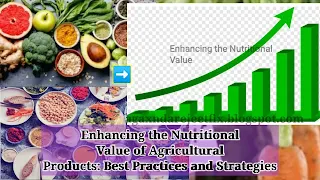Enhancing the Nutritional Value of Agricultural Products: Best Practices and Strategies
Enhancing the Nutritional Value of Agricultural Products: Best Practices and Strategies
Enhancing Nutritional Value|How to increase nutrition value in agricultural products.
Introduction:
Agricultural products form the foundation of our food system, providing essential nutrients for human health and well-being. However, in recent years, there has been growing concern about the declining nutritional value of these products due to factors such as intensive farming practices, soil degradation, and the use of chemical inputs. To address this issue, it is crucial to implement strategies that can help increase the nutritional value of agricultural products. This article will explore some of the best practices and strategies that can be employed to enhance the nutrition content of our food.
Soil Health Management:
The first step towards improving the nutritional value of agricultural products begins with healthy soil. Soil is the fundamental source of nutrients for plants, and its health directly impacts the nutrient content of crops. Implementing sustainable soil management practices, such as crop rotation, cover cropping, and organic matter additions, can enhance soil fertility, increase nutrient availability, and improve the nutritional quality of crops.
Balanced Fertilization:
Proper nutrient management is essential for maximizing the nutritional value of agricultural products. It is important to conduct soil tests to determine nutrient deficiencies and apply fertilizers accordingly. Using organic fertilizers, such as compost and manure, can improve soil structure and nutrient content while reducing the risk of chemical residue accumulation in crops.
Biodiversity and Polyculture:
Promoting biodiversity in agricultural systems has several benefits, including increased nutrient availability and enhanced nutritional value of crops. Intercropping, agroforestry, and companion planting can help create a diverse ecosystem, improving soil health and providing a wider range of essential nutrients. Additionally, diversifying crop varieties can enhance the nutritional diversity of agricultural products.
Water Management:
Water availability and quality significantly impact crop nutrition. Proper irrigation practices, such as drip irrigation or precision watering systems, can reduce water stress and nutrient leaching. Conserving water resources and preventing contamination of water sources are vital to maintain the nutritional integrity of agricultural products.
Integrated Pest Management (IPM):
Pesticides and chemical residues can negatively affect the nutritional quality of crops. Implementing IPM practices that focus on biological control methods, crop rotation, and pest-resistant varieties can minimize the use of synthetic pesticides. This approach ensures healthier crops and reduces the risk of chemical residues, thereby preserving the nutritional value of agricultural products.
Post-Harvest Handling and Storage:
Proper post-harvest handling and storage practices are essential for preserving the nutritional value of agricultural products. Minimizing exposure to heat, light, and oxygen, and implementing appropriate storage conditions can help retain the nutrient content of crops. Efficient transportation and distribution networks are also crucial to reduce nutrient loss during transit.
Genetic Improvement and Biofortification:
Advancements in plant breeding techniques can contribute to enhancing the nutritional value of agricultural products. Through selective breeding or genetic engineering, crop varieties can be developed with increased nutrient content, improved nutrient absorption, and enhanced resistance to environmental stresses. Biofortification, a process that increases the nutrient content of crops through agronomic or genetic means, is an effective approach to address specific nutrient deficiencies in populations.
Consumer Education and Awareness:
Raising awareness among consumers about the importance of nutrition and the factors that influence the nutritional quality of agricultural products is crucial. Educating consumers about making informed choices, such as preferring locally grown, organic produce, and selecting diverse and nutrient-rich foods, can encourage demand for nutritionally superior agricultural products. This, in turn, can incentivize farmers to prioritize and implement practices that enhance nutritional value.
Conclusion:
The nutritional value of agricultural products can be significantly improved through a holistic approach that encompasses sustainable soil management, balanced fertilization, biodiversity promotion, water management, integrated pest management, proper post-harvest practices, genetic improvement, and consumer education. Implementing these strategies will not only enhance the nutrient content of our food but also contribute to sustainable agricultural practices, environmental conservation, and improved human health. By prioritizing nutrition, we can pave the way for a healthier and more sustainable food system.
Friends, how did you like this article, you will definitely tell in the comment section and thank you for visiting our website continuously to get such articles.
Join my Teligram channel - Click here
Join my whatsapp group -Click here











Post a Comment